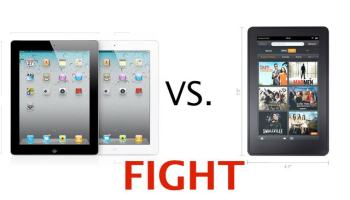My idle thoughts on tech startups
Amazon vs Apple: A Tale of Two Business Models
 Amazon announced it’s first real foray into the tablet wars last week with the Android based Kindle Fire. While not as large as Apple’s iPad and lacking a 3G connectivity option, the Fire packs a lot of capability into a $199 price point (I already pre-ordered mine).
Amazon announced it’s first real foray into the tablet wars last week with the Android based Kindle Fire. While not as large as Apple’s iPad and lacking a 3G connectivity option, the Fire packs a lot of capability into a $199 price point (I already pre-ordered mine).
The Kindle Fire isn’t the first Android tablet and other products out there from Samsung, HP, RIM, and others have features the Fire lacks. But that doesn’t really matter. The Kindle Fire (and it’s successor upgrades) will be the first Android tablet to sell 10M+ units.
Why? Because consumers don’t want a portable touchscreen computer… they want a product that integrates content & media suite seamlessly with the hardware. Look no further than the last couple decades of the video game console business… there’s a reason we all had Sega Genesis’s in the ’90s rather than Neo Geos, despite the latter being a far superior piece of hardware. In the tablet space, Amazon is the first company other than Apple to both realize this and legitimately have the capacity to deliver it. The only other potential player in the tablet space who can credibly pull this off is Google. Kudos to Apple for getting it right first.
What’s striking to me is the polar opposite business models Apple and Amazon have established to crack the same nut. Apple has a marginally profitable digital content business which drives a highly profitable hardware business. That’s why a 3G iPad 2 costs $600-800 retail, which nets Apple a very healthy profit of several hundred dollars (manufactured cost is ~$330).
Amazon on the other hand probably loses a little money on every single Kindle Fire they sell. But they have the dominant eBook business that’s pretty profitable, and will likely become more profitable over time as the shift from paper to digital continues (and Amazon’s power w/ publishers grows). Amazon also has a suite of other digital content from movies to music to TV shows to magazines which will all generate incremental profit for every Kindle Fire sold. Plus many people speculate that purchasing behavior of physical goods from Amazon will increase for Fire owners. I’m uncertain about the latter, plus it’s not like all those iPad owners are buying physical goods from Apple when they tap away on the couch. But either way Amazon has a marginally unprofitable hardware business to support a pretty profitable content and commerce business.
While both Amazon and Apple are rather profitable given the industries that they’re in (e-commerce, hardware), to be clear neither has software like profit margins of 80%+. Amazon’s gross margin is around 25% and Apple’s is about 40%. But both are fully aware that winning with consumers in tablet space requires an integrated approach of hardware and content, and despite taking different roads, both have the ability to deliver on that promise.
